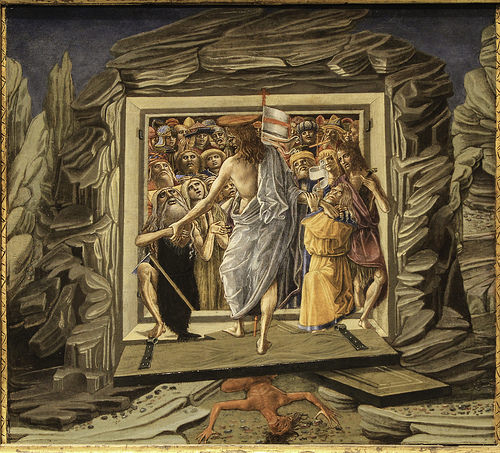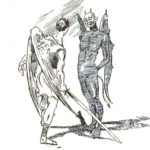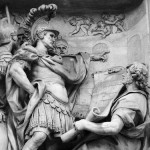We run our website the way we wished the whole internet worked: we provide high quality original content with no ads. We are funded solely by your direct support. Please consider supporting this project.

What Happened on the Cross?
Since the time of Anselm (11th century), and especially since the Reformation in the 16th century, the tendency of the Western church has been to focus almost all of its attention on the anthropological dimension of the atonement, usually to the neglect of the cosmic dimension that is central to the NT. In the standard Protestant view, the chief thing God was accomplishing when he had Jesus die on the cross was satisfying his perfect justice and thereby atoning for our sins. The work of the cross is centered on us.
While I do not minimize this aspect of Christ’s work, I cannot agree that the primary significance of the cross is found here. From the perspective of the NT, the anthropological significance of Christ’s death and resurrection is rooted in something more fundamental and broad that God was aiming at: to defeat once and for all his cosmic archenemy, Satan, along with the other evil powers under his dominion, and thereby to establish Christ as the legitimate ruler of the cosmos, and human beings as his legitimate viceroys upon the earth.
Whereas since Anselm the dominant way of thinking about the atonement focused on what it accomplished for humanity (reconciliation to God), and thus viewed what it accomplished against Satan and evil powers as a byproduct, the view that I espouse is that the NT construes the relation between these two aspects of the cross in the converse order. Christ’s achievement on the cross is first and foremost a cosmic event—it defeats Satan.
Thus as Scripture portrays the matter, the foundational reason Christ appeared was “to destroy the works of the devil” (1 Jn 3:8), to disarm “the rulers and authorities” (Col 2:15), and to “destroy the one who has the power of death, that is, the devil” (Heb 2:14). The consequence of this victory is that he is seated on his rightful throne, the whole cosmos is liberated from a tyrannical and destructive ruler, humanity is delivered “from the power of darkness and transferred … into the kingdom of his beloved Son (Col 1:13), and all who accept it are thereby reinstated to the original position and responsibility of stewards of the creation that God had always intended for us.
While Christ’s substitutionary death for sinful humans is central for understanding what Christ did for us, therefore, this dimension of Christ’s work is possible only because of the broader cosmic victory Christ won on the cross.
Through the death and resurrection of Jesus Christ, God stripped Satan and all levels of demons of all their power (Col 2:15). Therefore Christ now reigns in the power of God far above all such demonic powers. Expressing the tension of the “already/not yet” that characterizes the entire NT, Paul can say that “all things” are already “under his feet,” (Eph 1:21-22) though the actual manifestation of this truth is yet in the future. But the central point remains: the work of the cross was about dethroning a cruel, illegitimate ruler and reinstating a loving, legitimate one: Jesus Christ. When Jesus Christ is reinstated, all who are aligned with his rule, all who are “in Christ,” all who are his “bride” and part of his “body,” are reinstated to their appropriate position of authority as well. In a word, we are saved because he is victorious.
—Adapted from God at War, pages 240-246
Image by Lawrence OP via Flickr
Category: Q&A
Tags: Already Not Yet, Atonement, God, God at War, Jesus, Satan
Topics: Atonement and The Cross, Spiritual Warfare, Cosmic Conflict
Related Reading

The Longing of Advent
The Advent season is a time of anticipating the coming of God, in Christ, a time of turning our imagination toward the revelation of God’s love for us. This after all is the deepest longing of our heart, and our natural longings always point us to something real. We grow hungry only because there’s such…

Podcast: If the Crucifixion Is God’s Victory Over Satan, Why Does Satan Keep Fighting?
Greg talks already-but-not-yet, perspectives of the principalities, and the toilsome life of a muon. http://traffic.libsyn.com/askgregboyd/Episode_0284.mp3

Why Didn’t Jesus Denounce Military Service?
A common objection to the claim that Jesus and the authors of the New Testament were opposed to all forms of violence is that neither Jesus nor anyone else speaks out against it. When soldiers asked John the Baptist what they should do in response to his message, for example, he told them not to…

The God Who Embraces Our Doubt
Lawrence OP via Compfight Zack Hunt over at The American Jesus posted some of his thoughts on doubt, and it seemed fitting on this week before the Doubt, Faith & the Idol of Certainty conference to share what he had to say. We’re thinking he must have stumbled on Greg’s book or maybe God is…

Why Bart Ehrman Doesn’t Have to Ruin Your Christmas (Or Your Faith) Part 2
This is the second of several videos Greg put together to refute Bart Ehrman’s claims published in the article What Do We Really Know About Jesus? If you missed it, you can catch the first installment here.

By Chance or By God
pure9 via Compfight Is the world here by chance? Are we a product of an impersonal force that got the ball rolling and then history came about in what could be described as an “accident”? Greg’s father, an skeptic at the time, put it this way, “[C]ouldn’t we just have come about by accident? Isn’t…
